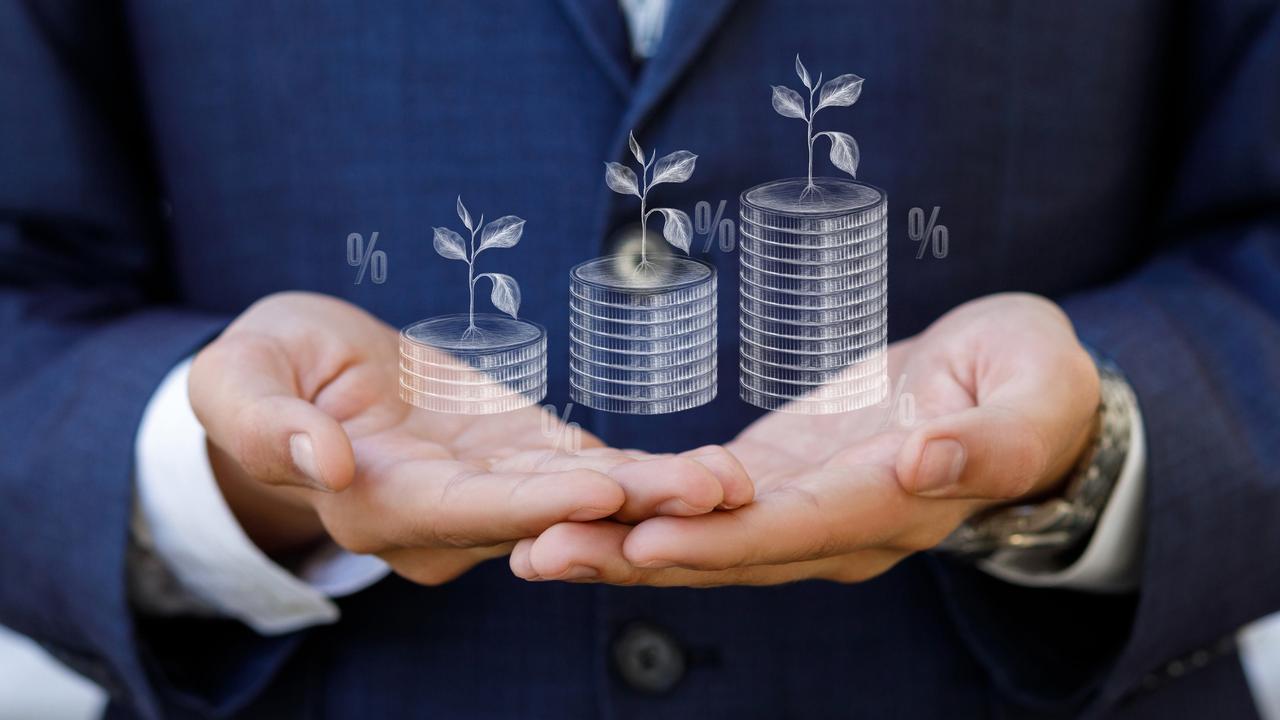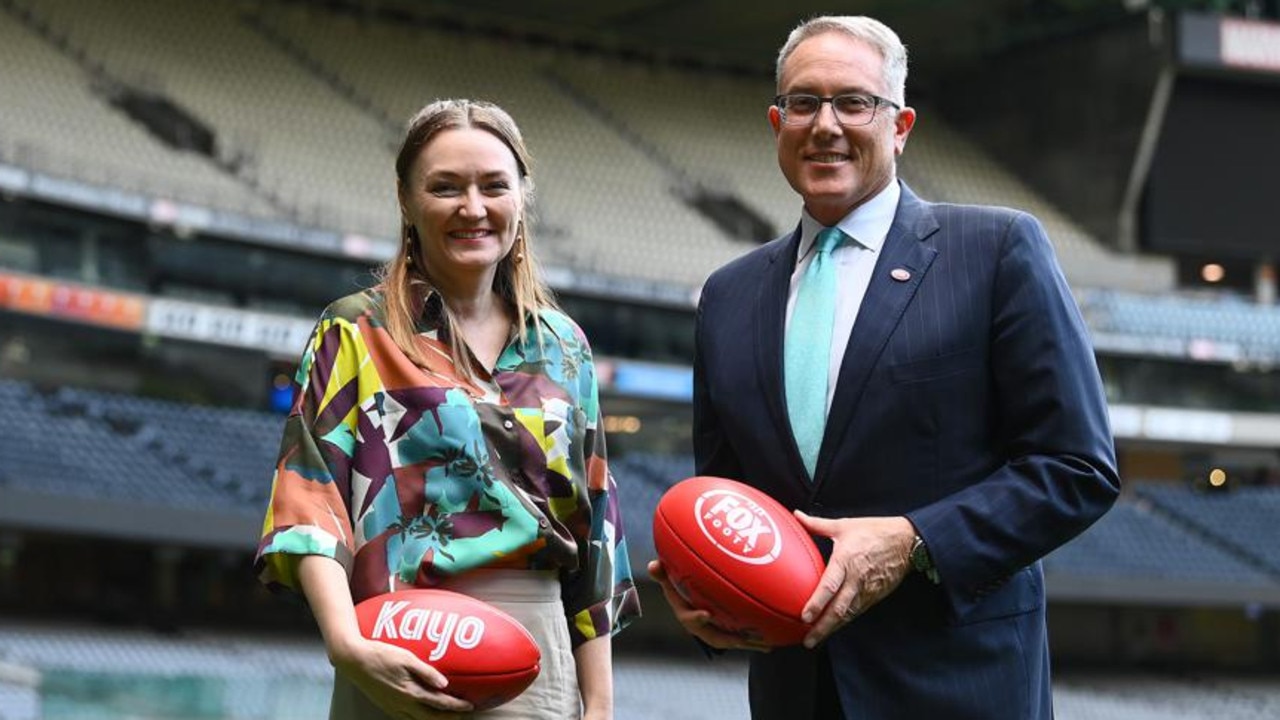Blue steel: Australia gets a ticket to Trump’s trade war
The promise of sweeping steep steel tariffs is set to deliver the first big test for Anthony Albanese’s relationship with the White House in the Trump 2.0 era.
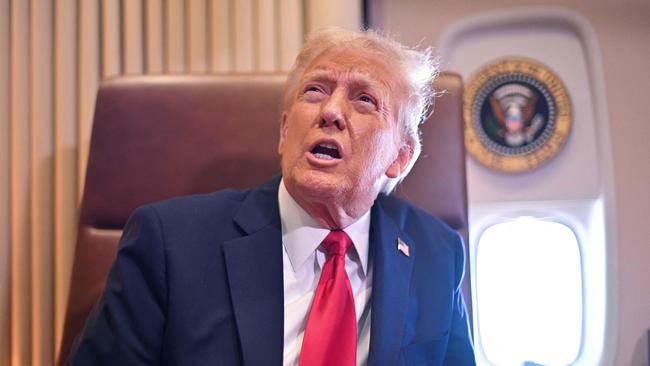
Australia just got a ticket to Donald Trump’s trade war, with the promise of sweeping steep steel tariffs set to deliver the first big test for Anthony Albanese.
Markets are starting to come around to the idea that Trump’s tariff bark is worse than his bite, with the US president holding back on tariff demands on Canada and Mexico in exchange for cutting deals on border security.
Threatened tariffs on Chinese products have materialised, however the rate at 10 per cent has come in much lower than expected.
As always, the devil will be in the detail. However, if Trump follows through, the stakes could be far higher for Australia in the long run.
Back in 2018, Australia was just one of a few countries – Argentina and Brazil being the two others – given a pass from being slapped with steel tariffs during Trump’s first term.
Albanese is set to speak to Trump in the next day.
Whether Canberra has as much sway with Washington today remains to be seen.
Although Australia doesn’t sell that much steel to the US – a little over $630m last year – Trump’s threatened 25 per cent wholesale tariff on all steel and aluminium sold into the US will still have a serious knock-on effect for our biggest export partner China.
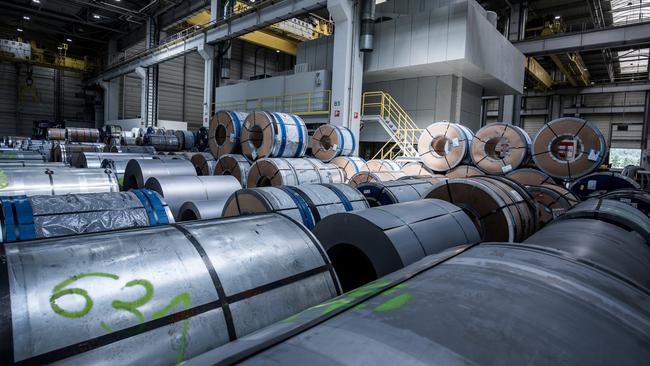
From the outset, Australia’s biggest steelmaker BlueScope is well insulated from the tariffs given it operates the massive North Star steel mill in Ohio, fitting the bill of Trump’s demands of “Make it in America”.
North Star is one of the lowest cost producers in the US, and generates nearly a third of BlueScope’s sales but as much as half of its profit.
Here BlueScope is set to win out from a broad-based tariff given it is likely to lift US steel prices, just at the time demand there is rebounding.
This represents a boost for the steel maker’s profits – even more so when US income is converted back into local currency.
Little wonder, BlueScope’s shares rallied nearly 4 per cent earlier Monday, although easing later.
However, the implications for the broader Australia economy could be significant. And that’s behind the sharp slide in the Aussie dollar earlier Monday, given we are leveraged to the Chinese economy.
China is not a big exporter of raw steel to the US, but its steel flows into finished products like machines and cars.
Last time around, when Trump put steel tariffs in place, China’s breakneck economic growth could soak up all the additional steel that would have ultimately flowed into the US.
The picture is a lot different today, with China’s economy remaining gripped by a housing crisis, that is also hammering consumer confidence.
Chinese authorities have unveiled several major stimulus programs, but these are yet to fire up the economy. At the same time, the rest of the world, including Europe, is still stuck in a post-pandemic funk.
China, too, has started to retaliate with its own tariffs on US goods, which will further dampen consumer confidence there.
All this means Australia’s biggest exports – iron ore – are likely to be hit as steelmakers there curb output. Metallurgical coal – another big ingredient in steel making, could see a drop in demand and a pullback in prices.
The big miners BHP, Rio Tinto as well as Andrew Forrest’s Fortescue were off Monday as investors were digesting details of the tariff threat.
There could be a silver lining for Fortescue. On the whole it ships lower-grade iron ore, which is often in higher demand when the met coal price falls. This lever helps China’s steelmakers manage margins during downturns.
Domestic steel players, such as Sanjeev Gupta’s Whyalla-based Liberty Steel or the three east coast aluminium smelters – each backed by Rio Tinto – will be seriously worrying about the tariff threat.
With excess steel looking for a home, not matter what the price, Australia has long been seen as a willing market for cheap imports. BlueScope’s domestic business also competes directly against Chinese imports.
This will be extremely damaging as cheap China steel threatens to squeeze out local manufacturers, potentially forcing production cuts and ultimately jobs.
Already Australia’s aptly named Anti-Dumping Commission faces dozens of complaints of coated steel, coil and structural steel being dumped in Australia with the blame going to China. Trump’s trade war means another wave will be coming this way.
JB Hi-Fi rewrites script
Tech retailer JB Hi-Fi has long been a candidate to become a victim of its own success.
After its shares recently cracked the $100 mark to be up more than 60 per cent since mid-last year, that moment seems to be fast arriving.
Surely there’s only so much runway left in selling iPhones, laptops or even TVs to interest rate-weary Aussie consumers?
JB chief executive Terry Smart is ready to rewrite the script as he plots the next wave of growth for the retailer.
Much of this will be longer term, but last year’s $48m acquisition of upmarket kitchen appliance retailer E&S is set to form a big part of this.
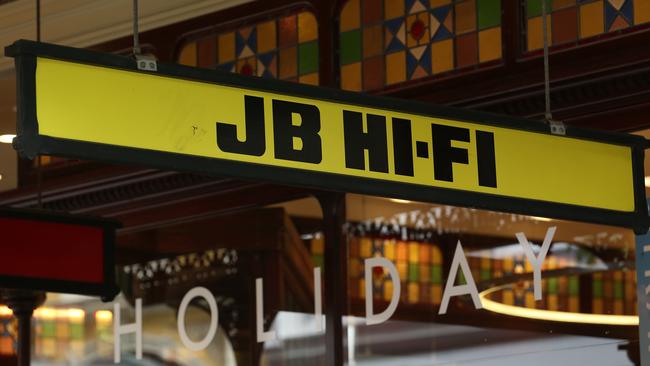
The brand is not well known outside Victoria but in a few years the orange big-box retailer that specialises in expensive stove tops and bathroom fit-outs will start popping up across Australian suburbs. That’s when the real growth kicks in.
For the first time, investors have been able to get good a look inside E&S. And while from a small base – with annualised sales of just under $200m – the retailer is delivering gross margins of nearly 30 per cent.
That compares to about 22 per cent for the flagship “yellow” JB brand and 23 per cent for the “blue” Good Guys homewares business.
E&S’s earnings margin falls away once costs are netted back in, but the gross point becomes an important starting point as the highly-productive JB machine switches on and more and more stores are opened across the country.
This will allow E&S to start spreading its cost base across a bigger footprint and support functions are shared with the JB head office.
E&S complements the much bigger Good Guys, which is built around growing families and selling replacements for everyday homewares and whitegoods.
E&S moves JB Hi-Fi into a premium appliance market, which is particularly suited for high-end home builds and renovations.
Smart’s plan is to get customers across their life cycle.
“It gives us access to a new category – bathrooms and very importantly, it gives us access to a new customer base, which is builders, architects and commercial, commercial developers,” Smart tells The Australian.
There’s 12 E&S stores at the moment, including one in the ACT. Smart is eyeing a few more in the home market of Victoria and getting the systems right before really making a push into Sydney and Brisbane.
Smart may have delivered a knockout set of numbers for JB Hi-Fi’s all-important interim results, but it was a high bar to pass. This was behind the near 5 per cent share price drop.
Sales were up nearly 10 per cent with the retailer delivering $5.7bn across all its brands.
Pre-tax earnings were up nearly 9 per cent to $420m, defying an economy feeling the pinch of interest rates and inflation. JB Hi-Fi is now sitting on more than $555m of cash and, apart from lease liabilities, the retailer has almost no debt.
JB Hi-Fi remains the engine of the retailer, boosting sales, margins and lowering costs through the December half. While The Good Guys and JB Hi-Fi New Zealand both returned to form helped by market share gains here and cash rate cuts across the Tasman.
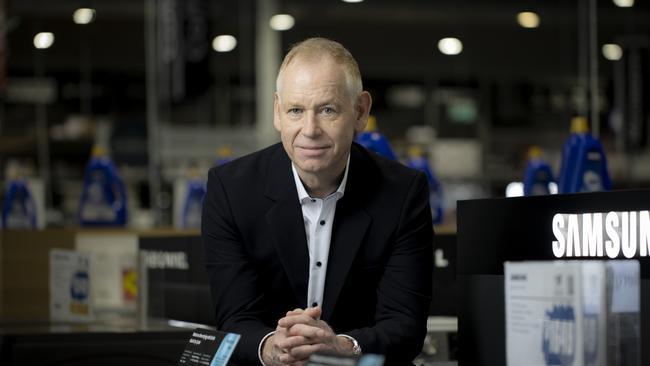
The collapse of vacuum retailer Godfreys last year gave an additional boost.
Smart says there’s no secret sauce apart from execution of the low-cost strategy. It’s having the range and the right prices.
“What we were doing is what we always have, and that is to stay focused on showing and proving the value to the consumer. That’s something we do every day, but it just resonates a lot more during these tougher times for household budgets”.
Elsewhere, Smart is starting to flex the sales potential in the JB Perks loyalty program that has now signed up just over 2 million in little more than two years. This will be important to drive sales as the program continues to ramp up and it generates more data.
If – as expected – the Reserve Bank cuts interest rates next week, this will flow directly into consumer confidence and onto the likes of JB Hi-Fi. From there it’s a matter of the market catching up again.
eric.johnston@news.com.au
Originally published as Blue steel: Australia gets a ticket to Trump’s trade war


